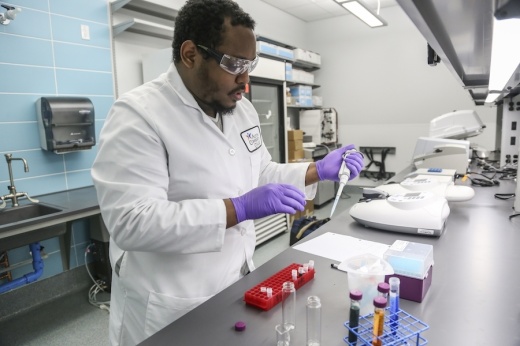Research and innovation being done by South Austin-based Celling Biosciences is researching ways people can avoid joint replacement and other invasive orthopedic surgeries.
The regenerative medicine company is just one of the many life science companies calling Austin home. While the biological science and health care industries are smaller in Austin compared to other metros across the state and country, the rapid pace of growth in recent years represents the area’s next frontier, according to local experts.
Two-minute impact
The establishment of the Dell Medical School in 2013 marked the beginning of a “new life science era” in Austin, said Stacy Schmitt, senior vice president of communications and external affairs for economic organization Opportunity Austin.
According to the organization, the region has over 260 life science companies, from pharmaceuticals and medical devices to information technology and research organizations.
Jason Scharf, an investor providing capital to life science startups and founder of health and tech podcast Austin Next, said Austin “generally punches above its weight” in the industry compared to other life science-heavy economies, such as Denver, Houston and Boston.
Despite this, Austin only has 5,800 hospital beds compared to Houston’s 21,000 beds and 1.6 million square feet of lab space compared to Boston’s 52.7 million square feet, according to a July 2023 report from Austin Next and Austin Medtech Connect.
“Imagine what we could be doing if we had more people working in the industry, if we had more beds, more clinicians, more lab space,” Scharf said. “I think one of the biggest gaps is that we don’t quite have the physical infrastructure.”
As of July 2023, Austin's life sciences industry includes:
- Over 260 companies
- Over 18,000 employees
- Nearly 74% employment growth since 2019
- 1.6 million square feet of lab space
Life sciences is an umbrella term used to describe many biological sciences, from the study of lab specimens to the treatment of patients, according to the Austin Next and Austin Medtech report. Some products of the industry include medical devices, such as cochlear implants, and the development of cures for different cancers.
On the local scale, health and education services make up about 11% of the greater Austin economy, according to data from the U.S. Bureau of Labor Statistics. The industry is one more opportunity for Austin to continue diversifying its economic portfolio to withstand economic hardships, said Bryce Bencivengo, director of public relations and media for the Austin Chamber of Commerce.
While bigger names downtown such as Dell Medical School and the future University of Texas at Austin Medical Center—which will add a hospital and an MD Anderson Cancer Center—are at the forefront, the South Austin market in particular is home to dozens of life science companies like Celling Biosciences, according to Opportunity Austin.
The market has the advantage of having access to better engineers, sales representatives and office staff, along with more markets to play into and hospitals and clinics to plan, said Parker Pruitt, executive vice president of Celling Biosciences.
“It’s good to know that a company like us is in your backyard,” Pruitt said. “I don’t see us leaving anytime soon ... It just kind of goes to show that you’re not limited by where you practice; investments in Austin and Texas in general are welcome and can work out for you one way or another.”How we got here
There are several indicators that point to whether an area is a good option to pursue life sciences, said Matt Schwab, managing director of Karlin Real Estate. Among those, Austin stands out in the relatively young age of the average working individual at 35.8 as well as its large supply of educational institutions.
The abundance of local higher education facilities pave the way for a reliable workforce for life science companies, Schwab said.
Between UT, Austin Community College and the other area higher education facilities, there are:
- About 8,800 science, technology, engineering and math graduates annually
- About 4,700 health care graduates annually
The bigger picture
While Austin shows key indicators for the success of a life sciences industry, available lab space remains an issue, Schwab said.
Alexandria Real Estate Equities, the largest lab space developer and investor in the nation, has also acquired two properties in the Central Austin area in recent years. One is 198,972 square feet and the other almost 2 million square feet, although the exact purpose for those facilities has not been confirmed, according to a company report.
Scharf said the last five years in particular have brought a life science explosion to Austin, thanks to the convergence of science and technology.
“A lot of the innovation is going to start coming, and I think that Austin—with this kind of thriving tech sector and thriving health care sector, and the convergence of the two—is really primed well for that,” Scharf said.
The influx of life science companies began after Dell Medical School opened in 2013 in Austin’s Innovation District. On Nov. 9, Austin City Council voted to create a research and sciences mixed-use subdistrict near the University of Texas’s J.J. Pickle Research Campus to pave the way for more science labs.
MAP
A number of pharmaceutical/biotech and medical device companies have set up shop in South Austin, including:
- Hanger Clinic: prosthetics and orthotic care
- Smith & Nephew: devices to repair and regenerate soft and hard tissue
- Spinesmith Partners: creates devices to treat spinal injuries
- Syneos Health: research services for pharma and biotech companies
- Tekton Research: clinical trials for pharma and device companies
- WuXi Clinical: research studies for pharma, bio and device companies
Compared to major research hubs across the country, from the top-performing Research Triangle Park in North Carolina to Texas’ own largest industry in Houston, Austin has a small life science industry, by all measures, according to the report from Newmark, a national real estate services firm. However, the exponential growth of Austin’s industry in three years proves, despite its size, life science opportunities are high in demand, Schwab said.
“There’s very high growth, but it’s in its [beginning] stages of growing, which is why we’re so excited about it,” Schwab said. “We see no reason why there won’t be more and bigger companies coming our way, if the infrastructure and real estate projects are there for these tenants to come.”
For the industry to continue to grow, the report from AustinNext and Austin Medtech Connect said the following must be prioritized:
- More available lab space
- Further investment into life sciences industry
- Continued supply of skilled workforce






